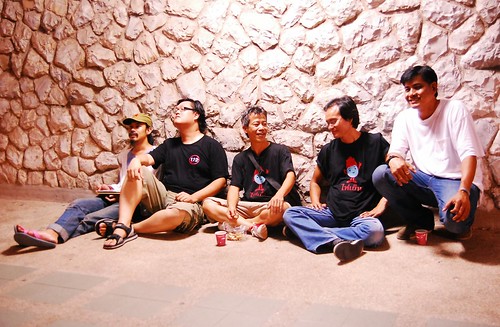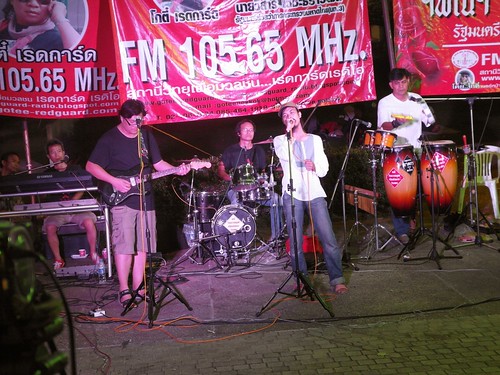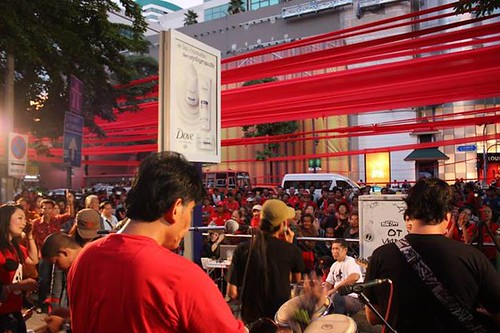In March 2006, the pro-establishment yellow shirts released a song by an anonymous composer that would later be played every day at the protests: ‘Mr Square Face.’ The rapper spends ten minutes telling the listeners about all the allegations one can think of against then Prime Minister Thaksin Shinawatra. It also names hundreds of people who, it says, were part of the Thaksin network. The song created a lot of impact. With the song’s catchy hook that compared Thaksin’s face to a square, people quickly learned and remembered the allegations of Thaksin’s wrongdoings. It shows how powerful music can be as a cultural front in bringing about change.
Music is known to be a powerful tool in political movements and revolutions. What if there was music which aims to push the envelope of the unutterable issue of the monarchy in Thai society where the lèse majesté law or Article 112 can land a person in jail for up to 15 years? Faiyen is an emerging pop band which transforms Thais’ private conversations about the monarchy into funny and catchy songs that people can sing and dance along to.
Founded in late 2010, Faiyen is a hybrid band of pop and modern
luk thung that has become more and more well-known to the red shirts and people who are critical of the monarchy. The band has never played on the stage of the United Front for Democracy against the Dictatorship (UDD), the main red shirt faction affiliated with Thaksin, because of its directness on the unutterable issues. They play only at small red-shirt gatherings organized by other factions of the reds or on a side stage to UDD-organized events.
Current Faiyen members (from left): Nithiwat Wannasirit (vocals), Port (guitar), Trairong Sinseubpol (band leader and keyboard), Kluay (drums), Ou (percussion)
Perhaps the best way to understand the band is to examine the lyrics.
“Only curiosity is jail. Jail. Jail. Jail. Jail. Only criticism is jail. Jail. Jail. Jail. Jail. Tell the truth is jail. Jail. Jail. Jail. . . . “
“Why not grant bail? How long to be in jail? Somyot, Da and Surachai. Why the need to jail them so long? …”
“Akong didn’t get bail. Jailed till death.”
Apart from its blunt lyrics which fiercely denounce Article 112, when it comes to a more sensitive issue, such as allegations of aiming to overthrow the monarchy, they change their tone more to wordplay and innuendo. In “Lom Jao (Mue),” (Lom jao means ‘overthrow the monarchy’, but lom jao mue means ‘break the bank in gambling’. Jao mue means ‘bank’) the song begins by saying that red shirts have been unfairly charged with aiming to overthrow the throne, saying it will now reveal the truth about the allegations of lom jao. Then it turns out to be just the breaking of the jao mue who went broke in a blackjack game.
Faiyen also has a song complaining about traffic jams that Thais have to suffer when a royal motorcade passes by. Some key words, such as a toothpaste tube, a bead of sweat, eight p.m., and hospital, are hints that make Thais connect to ideas related to the monarchy.
The most talked about song is “Uncle Somchai and Auntie Somjit”. The song speaks about the couple and their children.
“A red-shirt once asked me ‘Who’s Somchai?’ Who’s gonna dare answer that!” said Nitiwat Wannasiri, the lead singer, who is also a red-shirt activist.
In a Youtube video of the band’s performance of Uncle Somchai and Auntie Somjit at an unidentified occasion and place, the band received applause and acclaim from red shirts. The red shirts dance and sing along. Some even go up on stage to dance with the musicians. This may indicate that the red shirts think they know who Somchai is. However, this is not always the case.
“It depends on the province and the audience. For example, in the North East, Isan red shirts were suppressed by local red shirt leaders in terms of knowledge about politics,” said Trairong Sinseubpol, founder and leader of the band. “Chiang Mai red shirts, in contrast, get what the song implies immediately. They sing and laugh because they like our songs. They understand.”
Faiyen appearing at a red-shirt side stage near Rajamangala Stadium, while the UDD organized its rally inside the stadium on November 25, 2013. The side stage was organized by a community ‘Red Guard’ radio station.
The band leader said Faiyen aimed at “criticizing the elite who are the problem of Thai society.” The band’s name ‘Faiyen’, meaning ‘sparkler’ or a kind of handheld firework that sparkles in the air, symbolizes the band’s objective of using music to slowly immerse people in more critical ideas toward the establishment. “A sparkler stays alight and stays hot but before you know it, the fire has completely gone out.” mainstream music company, said he has adopted music industry techniques of composing pop music to make Faiyen’s music as catchy and easy to understand as possible to the mass red shirt audience.
Benjamin Tausig, an ethnomusicologist who studies Thai protest music, said the lyrics are neither new nor unfamiliar. What the songs say in fact appears in everyday conversation, and the slogans that the red shirts chant and print on their clothing.
“Perhaps it is because music -- including CDs and videos of performances -- generate semi-permanent records that link the musicians to their opinions, and so people have shied away from that,” said Tausig.
Asked if Thaksin appears in any of their songs, Trairong said there is only one line in a song mentioning that Thaksin’s popularity upsets the elite.
Unsurprisingly, because of the UDD strategy of compromising with the establishment, Faiyen has never been allowed to play on the UDD stage. The band members said they do not care.
“Fight and prostrate yourself at the same time. When will they win?” said Trairong “They all repeat the same things on the stage, never go further. The [UDD] have never really educated the mass.”
Faiyen appearing at a red-shirt rally at Ratchaprasong intersection against the controversial blanket amnesty draft bill on November 10, 2013. The rally was organized by Sombat Boonngamanong. (Photo courtesy of Faiyen Facebook).
Faiyen is not the most extreme in terms of music about the monarchy. There is also Pitsanu P., a red shirt who rewrote the lyrics of several royal songs and songs honouring the monarchy so that they turned into opposing it. The lyrics are obvious lèse majesté. The songs seem to have been written and distributed while Pitsanu lived in self-exile in a neighbouring country after being charged with lèse majesté for a speech at a red-shirt rally. His rewritten songs are subjected to censorship by the MICT.
But Faiyen is still in Thailand and aims at educating audiences in Thailand. They are always careful with the boundaries of the utterable.
Somsak Jeamteerasakul and Anon Nampha, a lawyer who has defended several lèse majesté cases, are their legal advisors. Lyrics are sent to the two to check if they are too risky with respect to lèse majesté.
“They’ll see if this song can land us in jail or not. If it goes too far, we’ll revise it, soften it, but the meaning must not change,” said Trairong.
‘Uncle Somchai and Auntie Somjit’ is the most risky of the band’s songs, he admitted, adding that the lyrics were carefully reviewed. And that was before the latest lèse majesté case where
Eakaphob L. has been charged for a speech about the two fictional characters. Eakaphob is still at large.
Asked if any of them fears being charged, most say they are no longer afraid and they believe that as musicians, they are granted a special status that the state authority has to grant them.
“What gets to people most easily is music. So if we are arrested, our music will be better-known, more popular. People all over the country will be craving our songs. If the authorities want that kind of effect, then arrest us,” said the guitarist who identified himself only as Port.
The content was modified on 6 November 2015.



